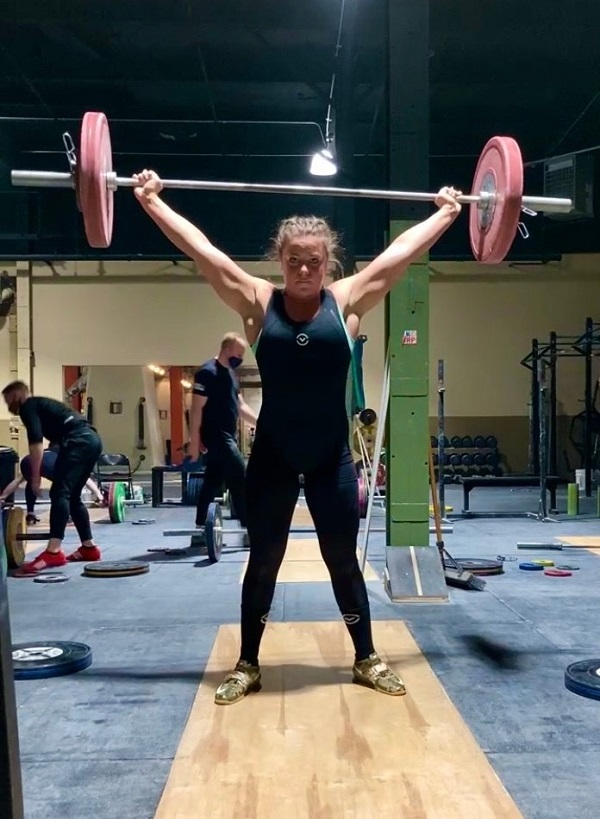Amanda M. - Diagnosed at age 19

I was diagnosed with lupus after my freshman year of college in 2010. I’ve always been involved in athletics, so when I could barely make it through swim practices in college, I knew something was off. By the end of the season, I was gaining weight, constantly puffy, losing hair by the handful, and running on empty no matter how much sleep I got. Looking back, I had symptoms in high school too. When I went home for the summer, I began to get increasingly sore. Every workout felt like I was having a heart attack. My athlete mindset told me that I was just out of shape; that I had to push harder, and soreness was an indicator that I was making progress.
Finally, I woke up to go to work one morning and thought I was paralyzed. I couldn’t move anything except slight movements of my head and hands. We immediately started the process of figuring out what was wrong with me. Luckily, being 19 at the time, there was a lot of urgency around finding an accurate diagnosis. I was fortunate to have only one misdiagnosis of a very rare form of Leukemia before they diagnosed and started treating me for Systemic Lupus Erythematosus. The main systems involved in my SLE are skeletomuscular, cardiovascular, and respiratory (I have a lot of residual scar tissue in my lungs from fluid in my pleural cavity). I was diagnosed with Rheumatoid Arthritis six months later. It took about two years of subsequent treatment to have more than a handful of days straight relatively symptom-free.
After I had to quit swimming, I was lost without something competitive to be working towards. At the time of my diagnosis, I was basically told that I’d no longer be able to consider myself an athlete; that being able to train competitively for a sport was unlikely, and potentially dangerous. But by the time I graduated college, I was on a good treatment plan and symptoms had become more predictable/manageable. I joined a CrossFit gym to meet people in my new city, and there was an Olympic Weightlifting club at the gym as well. I found out I had a little bit of natural weightlifting talent, and I started competing in 2015. My goal has always been to qualify for National level meets.
My weightlifting journey has not been linear. I’ve had bad flares that have lasted for months at a time and kept me from training. My daily “normal” is nowhere close to feeling 100%. In weightlifting, recovery is as important as training – for me, it is the most critical piece of the puzzle. Listening to my body, putting ego aside, and training for the long-term goal while simultaneously trying to maintain a sustainable quality of life is a daily challenge. In spite of that, I have earned state titles, state records, and have won more meets than I can count, however, a national qualification has eluded me, until now. Last week, I qualified for both major national meets by snatching 84kg (185#) and clean and jerking 107kg (235#).
I still can’t believe I did it. On paper, it shouldn’t have been possible. Eleven years since my initial diagnosis and on the brink of 30-years-old, I’ve never been prouder of myself. My point in sharing is that we all set our OWN limits. Of course, everyone’s lupus experience is different, but one’s quality of life and expectations of one’s self should not be based on a textbook, or even rhetoric from the medical community. My journey to the national stage was not easy, short, or straightforward… but every single second and struggle was worth it.
I’ve learned not to take my good days for granted, because they’re probably numbered. I’m impulsive with travel and experiences, because there may come a time when I don’t have that luxury. I lift heavy things competitively because I was once told I’d never be an athlete again. There are still some horrible days, and I definitely get frustrated. Every dropped jar, every time I physically cannot open a drawer much less get dressed, all the days that the barbell must take the backseat… I can get down, BUT I never feel bad for myself, and I never think “why me”. There are people out there suffering a lot more, with less support and fewer resources. I’m lucky to have had a quick diagnosis, a rock-solid team of doctors, and an unmatched support system. I’m truly grateful for every opportunity I’ve had to prove that I’m more than a diagnosis. And I most certainly am, and will always be, an athlete.



